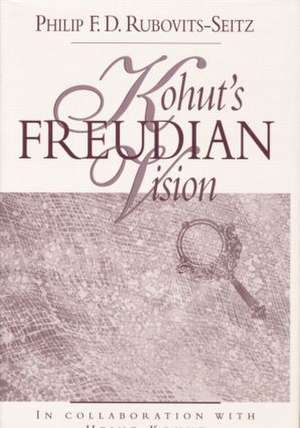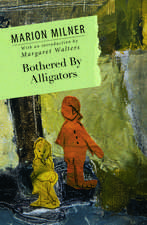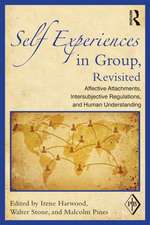Kohut's Freudian Vision
Autor Philip F. D. Rubovits-Seitzen Limba Engleză Paperback – 5 feb 2015
Prior to his development of self psychology, Kohut was a legendary teacher of Freudian theory at the Chicago Institute for Psychoanalysis. In this volume, Philip Rubovits-Seitz presents Kohut's previously unavailable lectures from his course on psychoanalytic psychology (prepared in collaboration with Kohut himself) along with an illuminating summary statement on Freudian theory jointly written by Kohut and Rubovits-Seitz.
Rubovits-Seitz continues with his own insightful analysis of Kohut's distinctive approach to Freudian theory. And he concludes by arguing persuasively why Kohut's later contributions should best be viewed as a continuation, rather than an abandonment, of this early vision. Kohut's Freudian Vision not only repairs an outstanding tear in received psychoanalytic history but also challenges self psychologists and contemporary Freudian psychoanalysts alike to renewed reflection.
| Toate formatele și edițiile | Preț | Express |
|---|---|---|
| Paperback (1) | 392.35 lei 6-8 săpt. | |
| Taylor & Francis – 5 feb 2015 | 392.35 lei 6-8 săpt. | |
| Hardback (1) | 656.57 lei 6-8 săpt. | |
| Taylor & Francis – mai 1999 | 656.57 lei 6-8 săpt. |
Preț: 392.35 lei
Preț vechi: 413.01 lei
-5% Nou
Puncte Express: 589
Preț estimativ în valută:
75.09€ • 78.10$ • 61.99£
75.09€ • 78.10$ • 61.99£
Carte tipărită la comandă
Livrare economică 12-26 aprilie
Preluare comenzi: 021 569.72.76
Specificații
ISBN-13: 9781138005419
ISBN-10: 113800541X
Pagini: 256
Dimensiuni: 152 x 229 x 15 mm
Greutate: 0.23 kg
Ediția:1
Editura: Taylor & Francis
Colecția Routledge
Locul publicării:Oxford, United Kingdom
ISBN-10: 113800541X
Pagini: 256
Dimensiuni: 152 x 229 x 15 mm
Greutate: 0.23 kg
Ediția:1
Editura: Taylor & Francis
Colecția Routledge
Locul publicării:Oxford, United Kingdom
Public țintă
Professional and Professional Practice & DevelopmentCuprins
Part I: Kohut's Lectures on Psychoanalytic Psychology (1958-1960). Three Periods in the Development of Psychoanalysis. How It All Began. The Dynamic and Topographic Points of View. Conflict, Transference, and Infantile Sexuality.Optimal versus Traumatic Frustration, Memory versus Hallucinations, and Daydreaming. Psychic Trauma and the Economic Point of View. Primal Repression and "Actual Neurosis." The Genetic Point of View. Symptom Formation. Symptom Formation From a Longitudinal Perspective. Freud's Theory of Psychosis. Freud's Theory of Depression and Preoedipal Phobias. Chapter 7 in The Interpretation of Dreams. Chapter 7, Section A: The Forgetting of Dreams. Chapter 7, Section B: Regression. Chapter 7, Section B: Regression (continued). Chapter 7, Section C: Wish-Fulfillment. Chapter 7, Section C: Wish-Fulfillment (continued). Chapter 7, Section D: The Function of Dreams. Chapter 7, Section D: The Function of Dreams (continued). Chapter 7, Section E: Primary and Secondary Process. Chapter 7, Section F: The Unconscious, Consciousness, and Reality. The Second Phase in the Development of Psychoanalytic Theory. Melancholia. The Structural Model and Neutralization. Aggression. Aggression (continued): The "Childhood Object" and the Superego. The Ego Ideal: Censuring and Approving Parts of the Superego. Narcissism. The Dual Instinct Theory. Changes in the Concept of Anxiety. Inhibitions, Symptoms and Anxiety: Chapters 1 and 2. Inhibitions, Symptoms and Anxiety: Chapters 3 and 4. Inhibitions, Symptoms and Anxiety: Chapter 5. Part II: Concepts and Theories of Psychoanalysis (1963). Part III: Kohut's Method of Synthesizing Freudian Theory. Part IV: Kohut's Concepts of Narcissism and Self Psychology: Continuities with Freudian Theory.
Notă biografică
Philip F. D. Rubovits-Seitz, M.D., is Clinical Professor of Psychiatry, George Washington University Medical Center, and Member of the Washington Psychoanalytic Society and Institute. He was previously Director of Psychiatric Research, Indiana University; Visiting Professor of Psychiatry, University of Cincinatti; and Staff Member, The Chicago Institute for Psychoanalysis. He has received a number of national and other awards for research and teaching.
Recenzii
"Students of psychoanalysis and psychoanalytic history will find Kohut's Freudian Vision an invaluable resource. Rubovits-Seitz brings a unique background and perspective to the task of presenting the reader with Kohut's previously unpublished lectures on Freudian theory, to which he adds his own personal observations and an analysis of how Kohut thought, lectured, and wrote. The final section of the book, devoted to demonstrating the continuity of Kohut's self psychology with Freudian theory, is most interesting and valuable. Scholarly and stimulating, it will be controversial with both Freudian and self psychologists. And that is what makes this book so good: it demands but also repays careful thought."
- Robert J. Leider, M.D., Chicago Institute for Psychoanalysis
"Philip Rubovits-Seitz and The Analytic Press have done a service to psychoanalysts of all theoretical persuasions-not just those identified with classical Freudian psychoanalysis or self psychology - by compiling and publishing Kohut's pre-self psychology lectures at the Chicago Institute. This book has both contemporary and historical interest: Kohut's exceptionally lucid synopsis of Freud's theory of psychoanalysis deserves to find a place in contemporary psychoanalytic curricula, while Rubovits-Seitz's admirable and thorough-going analysis of the continuity in Kohut's thinking provides an indispensable basis for pondering anew the personal and historical transformations that ultimately led Kohut to personalize his Freudian vision and thereby make his own contribution."
- Arnold D. Richards, M.D., JAPA
"An important book for those interested in the development of Heinz Kohut's thought and in the intellectual history of psychoanalysis generally. Kohut's Freudian Vision not only reveals the roots of Kohut's writings on self psychology in traditional psychoanalytic psychology; it also presents Kohut's sophisticated, often original, and compelling reading of Freudian theory. As such, Rubovits-Seitz's book presents a vision of psychoanalysis not as static dogma but as complex, contradictory, dynamic, and developing."
- Thomas A. Kohut, Ph.D., Sue and Edgar Wachenheim III Professor of History, Williams College
- Robert J. Leider, M.D., Chicago Institute for Psychoanalysis
"Philip Rubovits-Seitz and The Analytic Press have done a service to psychoanalysts of all theoretical persuasions-not just those identified with classical Freudian psychoanalysis or self psychology - by compiling and publishing Kohut's pre-self psychology lectures at the Chicago Institute. This book has both contemporary and historical interest: Kohut's exceptionally lucid synopsis of Freud's theory of psychoanalysis deserves to find a place in contemporary psychoanalytic curricula, while Rubovits-Seitz's admirable and thorough-going analysis of the continuity in Kohut's thinking provides an indispensable basis for pondering anew the personal and historical transformations that ultimately led Kohut to personalize his Freudian vision and thereby make his own contribution."
- Arnold D. Richards, M.D., JAPA
"An important book for those interested in the development of Heinz Kohut's thought and in the intellectual history of psychoanalysis generally. Kohut's Freudian Vision not only reveals the roots of Kohut's writings on self psychology in traditional psychoanalytic psychology; it also presents Kohut's sophisticated, often original, and compelling reading of Freudian theory. As such, Rubovits-Seitz's book presents a vision of psychoanalysis not as static dogma but as complex, contradictory, dynamic, and developing."
- Thomas A. Kohut, Ph.D., Sue and Edgar Wachenheim III Professor of History, Williams College
Descriere
Rubovits-Seitz continues with his own insightful analysis of Kohut's distinctive approach to Freudian theory. And he concludes by arguing persuasively why Kohut's later contributions should best be viewed as a continuation, rather than an abandonment, of










